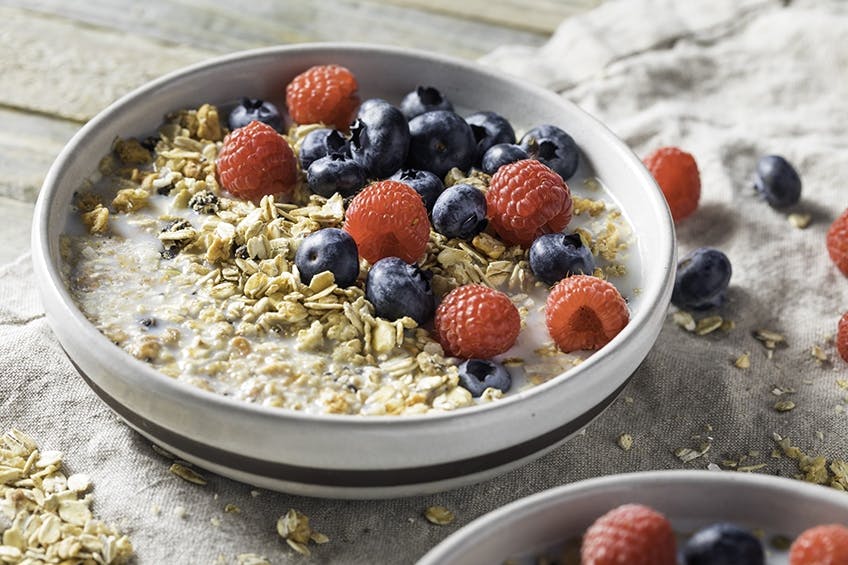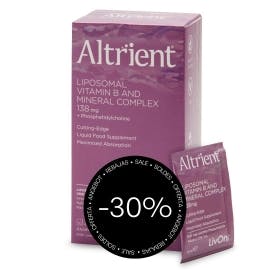High five for a plant-based January
Does the prospect of a New Year and new challenges fill you with excitement? Are you ready to try something that could really make a difference not only to your own personal health but to the rest of the planet?
Yes - we’re talking wholefood plant-based eating, a lifestyle choice that is building momentum around the globe. In the UK alone, statistics show a third of the population are either reducing their meat consumption or trying to give up eating meat entirely. One influential publication that’s contributing to this global transition is a book by Dr. T. Colin Campbell called The China Study. This book explores the issues relating to the environmental impact of animal farming and highlights the benefits of a more plant-based diet. So, if your future health is a subject that’s close to your heart then let’s talk about how this way of eating could make perfect sense for you and the planet.
The evolutionary perspective
Although the human gut is capable of digesting both plant and animal foods, there are a few key factors about human physiology that suggest we evolved to digest mostly plant foods:
- We have 20 molars and 8 front incisor teeth, perfect for crushing, grinding and biting into plant foods
- We only have 4 canine teeth - useful for eating meat
- Our jaws swing both vertically to tear foods, and laterally to crush, whereas the jaws of solely meat eating mammals swing only vertically
- The long length of the human gut supports our preference for plant foods; herbivores have a bowel length comparable to humans, whereas carnivores typically have a short bowel
- Chimpanzees, which are the closest living relative to humans, eat mainly fruit and vegetables; only 1-3% of their diet is of animal origin.(11)
What’s wrong with meat?
The meat you find in your supermarket today is quite different from the meat eaten by hunter-gatherers thousands of years ago. Domesticated meat today has much higher fat levels than wild animals and the type of fat is different too.
Domestic beef contains primarily saturated fats and only trace amounts of omega-3 fatty acids. By contrast wild meat contains over five times more polyunsaturated fat per gram and healthier levels of omega 3s.(3) These beneficial omega fats provide nutrients that help support cholesterol balance and protect and maintain body cells, helping reduce risk factors associated with strokes and heart disease.(4)
As a source of protein meat is not doing us any favours. Although protein is essential, most people eat far too much - the problem is it promotes disease. Studies show meat eaters have a significantly higher risk of high blood pressure, imbalanced blood lipids, high BMI and increased waist to hip ratio, all factors which may lead to heart disease.(1)
What’s more, evidence suggests that middle-aged people who consume a diet rich in animal proteins have a four times greater risk of dying from cancer. Specific types of cancer such as pancreatic, bowel and prostate cancer have been linked with red meat consumption and stomach cancer is associated with eating too much processed meat. (2, 8, 9)
The strong association between processed meats and cancer has prompted the World Health Organisation to classify processed meats as a Group 1 carcinogen.
Saving the environment
Animal agriculture occupies the majority of land worldwide but only delivers 18% of calories and 37% of protein into the food system for global consumption.(9) What’s more, 65% of land used to house and grow feed for farmed animals has been at the expense of native forests and grasslands.(6)
In the UK, experts believe that redesigning farming systems to grow food crops directly for human consumption allows for a higher production of healthier nutrient dense foods such as vegetables, nuts, pulses, fruits and wholegrains and may also contribute to reducing green-house gas emissions by 70% and reduce the area of land required to produce food by 76%. Furthermore, moving from animal-based to plant-based food production could actually increase protein availability.(6)
This is only a snapshot of the many factors that contribute to global warming and the reduction of our natural environment, but it is important nevertheless.
The health benefits of plant-based eating
Overwhelming evidence indicates that humans are better suited to wholefood plant-based nutrition.(8) It would appear that deviating from a predominantly plant-based diet, is a major factor in the development of many chronic diseases.
A diet rich in vegetables and fruit has been shown to reduce some of the risk factors associated with heart disease, Type 2 diabetes, digestive problems and various cancers as well as supporting blood sugar balance. What’s more wholegrains offer a complete package of benefits, unlike refined grains which have had most of their valuable nutrients stripped out during processing. Studies suggest that wholegrains could significantly lower cholesterol and insulin levels.(5)
According to the China Study (2005), which surveyed 6,500 adults in 65 different regions across China to observe the links between animal product consumption and chronic illnesses; the consistency of results led to one conclusion - the closer people came to an all plant-based diet, the lower the risk of chronic disease.(3)
What does a plant-based diet look like?
Eating a plant-based diet is quite straightforward and despite commonly held opinions, meat sourced protein is not essential. The important thing is to eat a wide and colourful range of fruit and vegetables as well as a variety of plant protein sources to ensure you get a good balance of all the essential amino acids your body needs.
Plant foods that contain high levels of protein include: beans, quinoa, lentils, chickpeas, nuts, seeds, brown rice and tofu.
A typical plant-based menu might include:
- Breakfast – muesli, fresh berries, almond milk
- Lunch – jacket potato and baked beans
- Dinner – veggie and tofu stir fry with rice
When to supplement and why
If you’re planning on giving up animal food products entirely there are two nutrients that you may struggle to gain from your diet alone, vitamin B12 and vitamin D.
- Vitamin D – A meat free diet contains little, if any, vitamin D without daily exposure to sunshine, fortified foods and certain mushrooms. Supplementing is a good move especially in the winter months.
- Vitamin B12 – Deficiency of this crucial nutrient is more common amongst the elderly and strict vegans. If this is you it would be wise to take a vitamin B complex. Altrient B Liposomal B Complex includes the all-important vitamin B12 in a clever delivery system that ensures speedy and maximised absorption.
If you’re not ready to jump straight in, why not at least try a plant-based January? Keep a journal and record your mood, energy levels, sleep quality and weight. The results may surprise and impress you, paving the way for a more flexible approach to nutrition. You certainly won’t be alone, some of the UK’s top celebrity chefs including Hugh Fearnley-Whittingstall, have embraced the concept that less is more where meat products are concerned.
Hugh says, “I am convinced that we need to eat much less meat, fish and dairy for the good of the planet, the welfare of farm animals and for the benefit of our health. Plants should be front and central in our diets.”(10)
He and many other food and nutrition experts are convinced it is the way forward for a better planet and better health.
Jacqueline Newson BSc (Hons) Nutritional Therapy
REFERENCES
- American Heart Association. Polyunsaturated fats. https://www.heart.org/en/healthy-living/healthy-eating/eat-smart/fats/polyunsaturated-fats [Accessed 3.12.19]
- Bouvard V et al. Carcinogenicity of consumption of red and processed meat. The Lancet 2015; 16,16; 1599-1600.
- Campbell TC & Campbell TM (2005). The China Study. BenBella Books: USA.
- D. Li. “Chemistry behind Vegetarianism”. Journal of Agricultural and Food Chemistry. 2011; 59, 3: 777 – 784.
- Harvard School of Public Health. The Nutrition Source, Whole Grains. https://www.hsph.harvard.edu/nutritionsource/what-should-you-eat/whole-grains/ [Accessed 3.12.19]
- Harwatt H & Hayek MN. Eating away at climate change with negative emissions. https://animal.law.harvard.edu/wp-content/uploads/Eating-Away-at-Climate-Change-with-Negative-Emissions%E2%80%93%E2%80%93Harwatt-Hayek.pdf [Accessed 3.12.19]
- https://www.scientificamerican.com/article/diet-high-in-meat-proteins-raises-cancer-risk-for-middle-aged-people/ [Accessed 3.12.19]
- https://www.nhs.uk/live-well/eat-well/red-meat-and-the-risk-of-bowel-cancer/.[Accessed 3.12.10]
- https://www.cancercouncil.com.au/21639/cancer-prevention/diet-exercise/nutrition-diet/fruit-vegetables/meat-and-cancer/. [Accessed 2.12.19]
- https://www.rivercottage.net/news/a-word-from-hugh-about-veganism. [Accessed 2.2.19]
- Mitani JC et al. Diet of Chimpanzees (Pan troglodytes schweinfurthii) at Ngogo, Kibale National Park, Uganda, 1. Diet Composition and Diversity. American Journal of Primatology 2012; 74:114-129.
- Murray M & Pizzorno J (2006). The Encyclopaedia of healing foods. Time Warner Books:UK.




